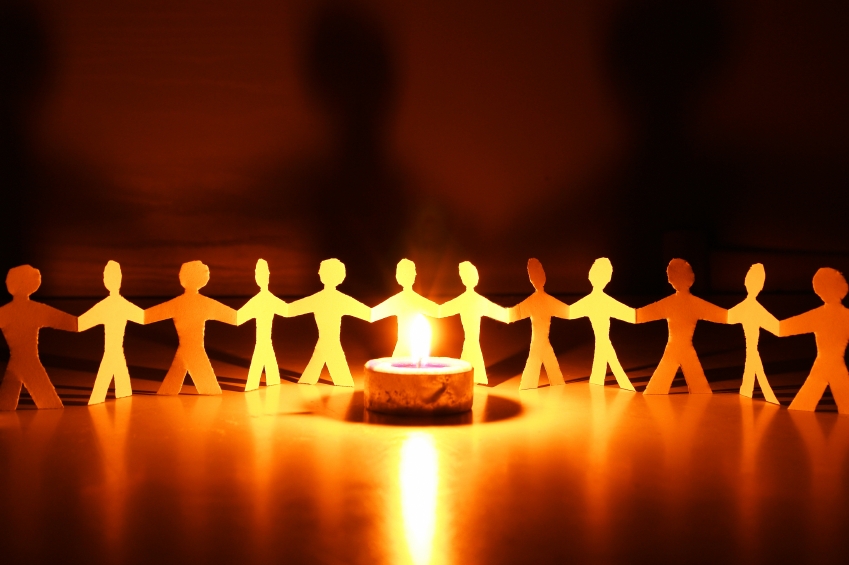Welcome. Whether you are an observant in Jewish religion in any of the many capacities or simply are Jewish and would like to observe some or all of the sacred traditions around the funeral of your deceased loved one; the the following information applies to all. Let me first start by saying in a most humble way “I am truly sorry for your loss, my heart goes out to you and yours at this time and I hope that any information I offer can help you along your journey.”
From the time of death through the burial Judaic traditions for funerals were created out of respect for the deceased and those left to live without them. As expressed in my previous post the deceased must be buried as soon as 24 hours after death or as close to that as possible unless under certain circumstances such as Shabbat, the High Holy Days, whether immediate family need to travel…that said, someone outside the Jewish faith can perform the funeral under these circumstances. More on this in a different post.
It is thought that mourning will not begin until the funeral is complete. The process of the funeral moves so quickly that with all the decisions that need to be made and processes that must occur, one cannot begin to think about mourning as there is simply no time.
It’s time to call the Rabbi. If you want a Rabbi to perform the funeral as is tradition and you don’t have one, you can start by calling on the Jewish Funeral Homes near you. If you live in a rural area of the states or the world you can either call someone like myself to help coordinate this for you or you can research for guidance from Rabbi’s not in your area. If you don’t have access to a Jewish funeral home and want to abide by the tradition the following will be very helpful in explaining the death process and preparing the deceased for burial.
Immediately following death the tradition of Shemira which is the guarding or watching over the body is invoked by those that are called Shomers. This is the tradition of having someone watch over the body of the deceased from the moment of death to the time of burial. It is actually considered the highest form of mitzvah (a good deed) to be a Shomer because you are helping someone who will never be able to repay your kindness. The tradition of Shemira was created to keep the body of the deceased safe from thieves and vermin where as today it has become a tradition of respect to the deceased and gives you a sense of peace knowing that your loved one has someone watching over them while they are in a strange cold place. A Jewish Funeral Home will supply the shomer for your loved one and if you don’t have that option you can assign or have someone in your circle volunteer.
Preparing for the burial is a beautiful sacred process beginning with the washing and drying of the body. Typically, once the body has been washed and dried it is wrapped in a white cotton shroud which is also known as a Kittel or sometimes Tallit or Tallis is used. The Kittel is a cotton white robe that represents purity. It is Jewish tradition for all, no matter their wealth be buried in a a Kittel/shroud as they are plain garments that signify equality for all in death. Some prefer to bury their loved one in a Tallit or Tallis which is a prayer shawl which looks like a regular shawl only it this has knotted fringes know as Tzitzit at the four corners.
It has long been thought that one cannot have a Jewish Funeral or be buried in a Jewish Cemetery if they have tattoos, body piercings or have donated their organs. From what I’ve researched this is not true and if your loved one chose to be an Organ Donor it is actually the highest form of Mitzvah one can give. You may have to find a funeral home that that will allow for your loved one to have a service and be buried even if they have chosen to be inked, pierced or donate their organs, the good news is that it is possible.
It is not Jewish tradition to be buried with anything from the lives we have lived. As we come in, so shall we leave…it is an attribute to the liberation or freedom from the weight of things or as I like to call “the-get” that hold us to this plain of existence, which is one reason why the casket be as minimal as possible. The other reason for a most simple casket is that it is believed that the quicker the body decomposes the sooner the soul can leave the body, therefore embalming is not something that is practiced. A soft wood like a pine casket, without any metal parts affixed and often times holes are drilled into the bottom of the casket so that the body touches the earth for quicker decomposition.
There is nothing against cremation except to say that there is a part in the Talmud or bible that states “all bodies not already in Israel will be rolled through underground tunnels to the holy land.” Also, in the recent past it has been a sad reminder of the many lost in the camps during WWII. That being said, in today’s funeral market Jewish Cremation has become increasingly more popular. Many find it more tolerable in the mourning process knowing their loved one has been decomposed quickly, they feel it is better for the environment and it is much more affordable than buying a plot in a cemetery.
There is no wrong or right when it comes to what you “feel” is best for your loved one’s funeral. The traditions and guidelines are simply that, traditional ways of doing things and suggestions on how to do them. Be your inner Guide, listen to your heart and trust that you already have all the answers. If it makes you feel a sense of peace then choose that option, if it inspires a feeling of love then follow that direction.
All will be well and if you need me just reach out.




